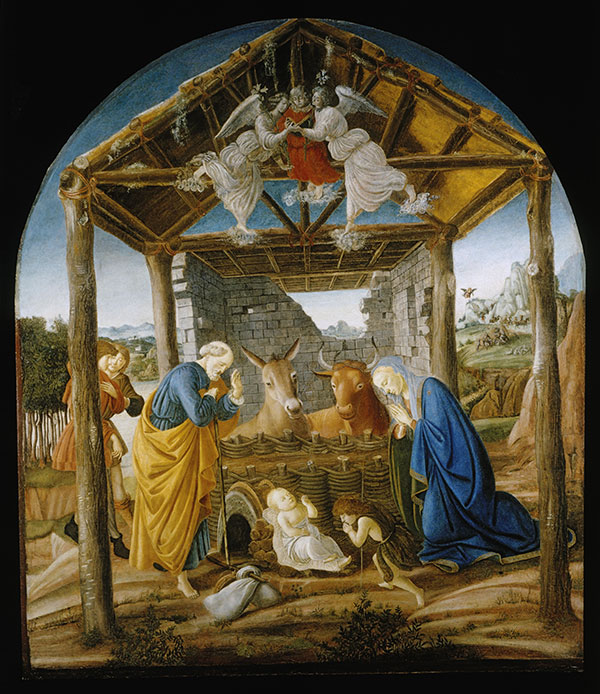 The music associated with the Christmas season has always maintained a special place in the Catholic Church and in the hearts of the faithful. There are many beloved sacred music works linked to this season, from G.F. Handel’s “Messiah” and Arcangelo Corelli’s “Christmas Concerto” to J.S. Bach’s “Christmas Oratorio.” One sacred Christmas Vespers text, however, seems to have captured the imagination of composers through the centuries more than any other: “O Magnum Mysterium.”
The music associated with the Christmas season has always maintained a special place in the Catholic Church and in the hearts of the faithful. There are many beloved sacred music works linked to this season, from G.F. Handel’s “Messiah” and Arcangelo Corelli’s “Christmas Concerto” to J.S. Bach’s “Christmas Oratorio.” One sacred Christmas Vespers text, however, seems to have captured the imagination of composers through the centuries more than any other: “O Magnum Mysterium.”
I was recently reminded of the beauty of this text prior to a Mass at St. Bartholomew Church in Sharpsville, Pa., when their phenomenal and holy priest, Father Matthew J. Strickenberger, was playing the work. As the title “O Great Mystery” suggests, the text describes the great mystery of the Nativity of Our Lord, lying in a manger with animals looking on, and closing with a reference to Our Blessed Lady whose virgin womb bore the Christ Child. While joyful, it is a reserved wonder and almost every composer – regardless of the century in which they lived – has set these words to music that illustrates the mysterious and sacred event.
The most famous is undoubtedly the motet by Tomás Luis de Victoria, a native of Ávila, Spain. His “O Magnum Mysterium,” written in 1572, dates from his employment in Rome as a Church musician. Three years later in the Eternal City, he was ordained a priest. In Victoria’s work, the listener is drawn into the significance of the role of Our Lady by the manner in which he sets “O beata Virgo” (“O blessed Virgin”). The phrase is preceded by two beats of silence immediately prior to enhance the syllabic text setting in homorhythmic texture, meaning there is one note per syllable with the voices sounding the words synchronously. These elements contribute to the textual clarity, to signify the importance of our Blessed Mother.
An example of a contemporary setting is by Pulitzer Prize-winning American composer Dr. Jennifer Higdon. As the composer explained, her setting of “O Magnum Mysterium” resulted from her desire “to create a bit of mystery, which is why wine glasses are a part of the piece.” Like Victoria’s composition, the work is scored for a chorus of soprano, alto, tenor and bass voices, but with texts in both Latin and English complemented by two flutes, chimes and two crystal glasses. The contemporary harmonies are quite different than the Renaissance counterpoint of Victoria, yet the work maintains the beauteous, mysterious nature of the text. A superior recording of the work can be found on the 2005 album “All Is Bright” by the Handel and Haydn Society Chorus.
Father Christopher Bond, pastor of St. Lucien Parish in Spruce Pine and St. Bernadette Mission in Linville, reflects on the text of “O Magnum Mysterium”:
“I find within ‘O Magnum Mysterium’ (in its various haunting arrangements) an extremely simple approach to the birth of Our Lord. So often, we get caught up in the anxieties of Christmas preparations that we fail to slow down to the point of mere marvel that God would humble Himself to enter our world, take on human flesh, and redeem the human person through the blood of the cross. If lowly animals can put their worries on hold and stop to ponder the glorious mystery of the Incarnation, why can’t we?”
As the faithful prepare to celebrate the Christmas season in a simpler way this year, the numerous settings of “O Magnum Mysterium” – in particular, the Victoria and Higdon compositions – can foster quiet devotion in pondering the stillness combined with wonder that defined the very first Christmas.
— Christina L. Reitz, Ph.D., Special to the Catholic News Herald. Christina L. Reitz, Ph.D., is professor of music at Western Carolina University in Cullowhee.
Listen to Tomás Luis de Victoria’s musical setting of “O magnum mysterium” performed by the Cambridge Singers:
‘O magnum mysterium’
O magnum mysterium,
et admirabile sacramentum,
ut animalia viderent Dominum natum,
iacentem in praesepio.
O beata Virgo, cujus viscera meruerunt
portare Dominum Iesum Christum. Alleluia.
O great mystery,
and wonderful sacrament,
that beasts should see the newborn Lord,
lying in a manger.
O Blessed Virgin, in whose unblemished womb
was carried the Lord Jesus Christ. Alleluia!

